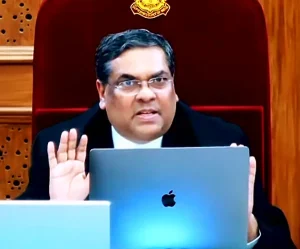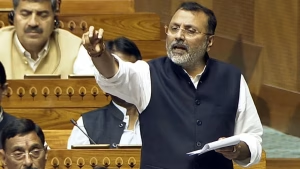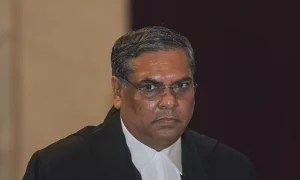New Delhi – In a significant development that marks a stark departure from its earlier stance, some of the Waqf Act provisions paused by Centre following scrutiny from the Supreme Court. The very provisions that the government vehemently defended during parliamentary debates—namely the inclusion of non-Muslims in Waqf boards and the handling of ‘Waqf-by-user’ properties—are now temporarily suspended until the next court hearing on May 5.
The Waqf Act provisions paused by Centre came under judicial scrutiny when challenged in the Supreme Court, prompting a remarkable contrast between the government’s parliamentary assertions and its subsequent legal position. This development highlights the ongoing tension between legislative intent and constitutional considerations regarding the management of religious endowments.

The Provisions Under Contention: What’s Being Paused?
The Waqf Act provisions paused by Centre specifically concern two controversial aspects of the amended legislation:
- The appointment of non-Muslims to the Central Waqf Council and state Waqf boards
- Changes to the status of ‘Waqf-by-user’ properties, which are properties recognized as Waqf due to long-standing religious usage
During the Supreme Court hearing, the Centre undertook that “the character of no Waqf property, including ‘Waqf-by-user’, whether declared by notification or by registration, would be changed till May 5,” the next date of court hearing. Similarly, the government agreed to pause any appointment to the Central Waqf Council and state Waqf boards until further judicial review.
Parliament versus Supreme Court: The Shifting Government Stance
The Waqf Act provisions paused by Centre represent a striking reversal from the position adamantly maintained during parliamentary proceedings. When Opposition members raised concerns about these very provisions in their dissent notes to the Joint Committee of Parliament and during marathon debates, the government dismissed these objections as “misconceptions.”
Government’s Position in Parliament

During Lok Sabha debates, Union Home Minister Amit Shah emphatically stated: “The Opposition is spreading the misconception that this Bill is an interference in the religious activities of Muslims and the property donated by them… The government does not want to interfere in the religious activities of Muslim brothers and the trusts associated with their donations.”
Shah had drawn a clear distinction between religious activities and administrative functions, insisting that “no non-Islamic member will get a place in the Waqf board’s work related to religious donations.” However, he maintained that non-Muslim members would be necessary to ensure “whether the property of Waqf is being maintained properly or not.”
The Supreme Court’s Challenge


Chief Justice of India Sanjiv Khanna raised a pointed question during the hearing that seemed to expose an inconsistency in the government’s approach: “Are you suggesting that minorities, including Muslims, should also be included in boards managing Hindu religious institutions? Please state that openly.”
This query from the CJI highlighted the potentially unequal treatment of different religious institutions under the amended law. When Solicitor General Tushar Mehta suggested that by the same logic, the Bench itself should not be hearing the case, the CJI sharply responded that the Bench “lost its religion the moment it sat in judgment.”
It was following this exchange that the Waqf Act provisions paused by Centre were announced as a temporary measure until the next hearing.
The Opposition’s Earlier Concerns Now Echoed by Supreme Court
Twelve Opposition MPs had previously registered their dissent to the Waqf Bill in the parliamentary panel, specifically objecting to the inclusion of non-Muslims in Waqf bodies and the rejection of the Waqf-by-user practice. These MPs represented a cross-section of opposition parties, including the Congress, Trinamool Congress, DMK, Aam Aadmi Party, Samajwadi Party, Shiv Sena (UBT), and AIMIM.
Opposition’s Arguments Against Non-Muslim Inclusion
During the Lok Sabha debate, Congress general secretary K.C. Venugopal had questioned the logic of including non-Muslims in Waqf boards while citing examples of Hindu religious institutions that exclude non-Hindus under certain conditions:
“The Vaishno Devi Temple Act and Devaswom Board in Kerala keep out non-Hindus under certain conditions. Waqf properties are as religious as temple trusts,” Venugopal had argued.
The Supreme Court’s questioning now appears to validate this concern about potential inconsistency in the treatment of different religious institutions’ governance structures.
The ‘Waqf-by-User’ Controversy
The Waqf Act provisions paused by Centre also include measures related to ‘Waqf-by-user’ properties. During parliamentary debates, Congress MP Naseer Hussain had highlighted the practical difficulties in documenting ancient religious properties:
“India is an ancient country… This is not just about masjids, but temples, gurudwaras, churches… If you ask about documents for 400-, 500-, 600-year-old buildings, where will people get them from? The proof is that communities believe that those properties exist even today and they are in long usage.”
Supreme Court’s Recognition of Historical Documentation Challenges
In a significant acknowledgment that aligns with the Opposition’s earlier concerns, Chief Justice Khanna recognized the inherent difficulty in producing documentation for pre-colonial religious structures:
“Now the fact of the matter is, before the British came, we did not have any registration of property… Many of the masjids may have been constructed in the 14th, 15th, 16th, 17th centuries. To require them to produce a registered sale deed will be impossible,” the CJI observed.
This judicial recognition underscores one of the primary reasons why the Waqf Act provisions paused by Centre include those related to Waqf-by-user properties. While the Solicitor General argued that “nothing prevented them from going and getting properties registered after 1923” when it “was mandatory,” the Court appeared unconvinced by this reasoning given the historical context of these properties.
The Government’s Claims About Waqf Property Misuse
During parliamentary debates, the Modi government had emphasized concerns about prime properties allegedly being claimed under Waqf. Union Minister of Minority Affairs Kiren Rijiju had specifically mentioned 123 such premises in the national capital that were purportedly subject to questionable Waqf claims.


The government’s stance in Parliament had been to present the amendments as necessary safeguards against potential misuse of Waqf designation. However, with the Waqf Act provisions paused by Centre following Supreme Court intervention, this argument appears to be temporarily set aside in favor of further judicial examination.
Balanced Judicial Approach to the Waqf Act Amendments
The Supreme Court, while raising serious questions about certain provisions, acknowledged that the amended Act contained both “good as well as questionable provisions” and expressed that it did not wish to stay the legislation in its entirety. This nuanced approach led to the selective pause of the most contentious provisions rather than a wholesale suspension of the Act.
Following this judicial observation, Solicitor General Tushar Mehta agreed on behalf of the government to the Waqf Act provisions paused by Centre until the next hearing. This temporary pause applies specifically to:
- Appointments to Waqf boards
- Any denotification of Waqf-by-user properties
Historical Context of Waqf Regulation in India
To understand the full implications of the Waqf Act provisions paused by Centre, it’s essential to consider the historical evolution of Waqf regulation in India.
The concept of Waqf, an Islamic endowment of property for religious or charitable purposes, has been recognized in the Indian subcontinent for centuries. The first major legislation governing Waqf properties in modern India was the Mussalman Waqf Act of 1923, which introduced formal registration requirements for Waqf properties.
Post-independence, the Waqf Act of 1954 established a more comprehensive framework for Waqf administration, which was subsequently replaced by the Waqf Act of 1995. The 1995 Act created the current structure of the Central Waqf Council and state Waqf boards, which have been the subject of periodic amendments, including the recent controversial changes now partially paused by the government.
Constitutional Questions at the Heart of the Controversy
The debate over the Waqf Act provisions paused by Centre touches on fundamental constitutional principles regarding religious freedom, equal treatment of religious institutions, and the state’s role in religious affairs.
Article 25 of the Indian Constitution guarantees freedom of religion, while Article 26 protects the right of religious denominations to manage their own affairs in matters of religion. However, these rights are subject to public order, morality, health, and other provisions of the Constitution.
The question before the Supreme Court essentially concerns whether the amended Waqf Act strikes the appropriate balance between regulatory oversight and religious autonomy. The Court appears to be examining whether the inclusion of non-Muslims in Waqf boards constitutes undue interference in religious affairs, especially when similar requirements are not imposed on institutions of other faiths.
Implications of the Centre’s Temporary Pause
The Waqf Act provisions paused by Centre creates a period of legal uncertainty for Waqf administration across the country. During this interim period until May 5:
- No new appointments can be made to the Central Waqf Council or state Waqf boards
- No changes can be made to the status of Waqf properties, including those classified as ‘Waqf-by-user’
This pause affects the functioning of Waqf institutions nationwide and potentially delays the implementation of other provisions of the amended Act that may be contingent on board appointments or property status determinations.
Political Ramifications of the Government’s Position Shift
The abrupt change in the government’s stance—from vehemently defending these provisions in Parliament to agreeing to pause them in court—raises questions about the political calculus behind the Waqf amendments.
The Waqf Act provisions paused by Centre could be interpreted as an acknowledgment of the constitutional vulnerabilities in the amended legislation. Opposition parties, many of which had opposed these provisions during parliamentary debates, may view this development as vindication of their concerns.
The controversy also highlights the ongoing debate about secularism and the state’s relationship with religious institutions in India’s diverse and complex socio-religious landscape.
Expert Perspectives on the Waqf Act Amendments
Legal scholars and experts on constitutional law have offered varied perspectives on the Waqf Act provisions paused by Centre. Some argue that regulatory oversight of religious endowments is necessary to prevent misuse and ensure proper management, while others contend that different standards for different religious institutions could violate constitutional principles of equality.
Constitutional law experts point out that the Supreme Court’s questioning reflects an important principle: if the state wishes to intervene in the administration of one religious community’s institutions, it should apply similar standards across all religious denominations.
Comparative Legal Analysis
The Waqf Act provisions paused by Centre have triggered a nationwide debate on religious autonomy. Unlike laws for other communities, the Waqf Act provisions paused by Centre do not follow the pattern of religion-specific administrative boards. The Waqf Act provisions paused by Centre have led to discussions about the representation of communities within these bodies.
Where the Waqf Act provisions paused by Centre allow for non-Muslim members in Waqf Boards, other laws such as the Hindu Religious and Charitable Endowments Acts and the Sikh Gurdwaras Act do not. The Waqf Act provisions paused by Centre differ by enabling outside intervention in Muslim religious institutions. This divergence from tradition has made the Waqf Act provisions paused by Centre a focal point for constitutional review.
State laws regulating Hindu temples often appoint government-led boards; however, those boards, unlike the Waqf Act provisions paused by Centre, are filled with members from the Hindu community. The Waqf Act provisions paused by Centre stand apart by allowing non-Muslim involvement in Waqf governance.
Critics argue that the Waqf Act provisions paused by Centre contradict the precedent of religious institutions being self-regulated. The Waqf Act provisions paused by Centre also challenge established norms by inviting constitutional scrutiny regarding religious freedoms. Comparisons highlight how the Waqf Act provisions paused by Centre are unique among religious endowment laws.
Supreme Court’s Next Hearing on May 5: Future of Waqf Act Provisions Paused by Centre
The Waqf Act provisions paused by Centre are awaiting a crucial Supreme Court review set for May 5. As the Waqf Act provisions paused by Centre return to court, legal experts predict significant implications. The Court might choose to extend the pause on the Waqf Act provisions paused by Centre, ensuring further scrutiny. Alternatively, parts of the Waqf Act provisions paused by Centre might be allowed pending full constitutional vetting. The judiciary could strike down the Waqf Act provisions paused by Centre if found inconsistent with fundamental rights.
Another possibility is that the Court interprets how the Waqf Act provisions paused by Centre should be implemented constitutionally. The Waqf Act provisions paused by Centre may result in guidelines that refine their enforcement. If changes are required, the Waqf Act provisions paused by Centre could trigger legislative amendments.
Government ministries involved in the Waqf Act provisions paused by Centre may face a mandate to reassess current practices. The Waqf Act provisions paused by Centre thus serve as a gateway to wider administrative reforms. Legal observers are watching the Waqf Act provisions paused by Centre as a potential precedent-setting case.
Broader Implications: Constitutional Interpretation of Waqf Act Provisions Paused by Centre
The Waqf Act provisions paused by Centre bring to light key constitutional tensions. These include religious freedom, state authority, and equal treatment. The Waqf Act provisions paused by Centre are not merely legislative quirks but symbols of the state-faith dynamic. Through judicial review, the Waqf Act provisions paused by Centre show how courts balance rights with governance.
As legal arguments unfold, the Waqf Act provisions paused by Centre become central to a debate on religious equality. The judiciary’s role in the Waqf Act provisions paused by Centre is to ensure adherence to constitutional mandates.
The pause of the Waqf Act provisions paused by Centre acknowledges that oversight must not infringe upon religious identity. The Waqf Act provisions paused by Centre underscore the need for careful constitutional calibration. Where earlier cases defined limits on state intervention, the Waqf Act provisions paused by Centre test those boundaries.
This review of the Waqf Act provisions paused by Centre will likely shape future legal standards. Constitutional experts suggest that the Waqf Act provisions paused by Centre could redefine administrative fairness. Hence, the Waqf Act provisions paused by Centre are about more than just Waqf boards—they are about India’s foundational legal values.
Parliamentary Defense vs Judicial Response to Waqf Act Provisions Paused by Centre
The Waqf Act provisions paused by Centre were defended robustly in Parliament. However, the judiciary’s response to the Waqf Act provisions paused by Centre diverged from legislative confidence. This discrepancy shows the unique constitutional checks applied to the Waqf Act provisions paused by Centre. While the legislature may support reforms, the Waqf Act provisions paused by Centre show how the judiciary ensures constitutional safeguards. The Waqf Act provisions paused by Centre highlight the importance of judicial independence in democratic systems. The tension between Parliament and the Court over the Waqf Act provisions paused by Centre reveals a deeper dynamic.
Despite political backing, the Waqf Act provisions paused by Centre remain under intense legal examination. Judicial pauses like that on the Waqf Act provisions paused by Centre are tools of constitutional accountability. This approach allows for rights-based review of the Waqf Act provisions paused by Centre without invalidating legislative intent. The Waqf Act provisions paused by Centre have therefore become symbolic of Indian federalism at work.
They represent how constitutional democracies manage religious sensitivity. Ultimately, the Waqf Act provisions paused by Centre reaffirm that no legislation is above fundamental rights.
Final Word: Constitutional Balancing Act in Religious Institution Governance
The ongoing controversy surrounding the Waqf Act provisions paused by Centre highlights the delicate balance between regulatory oversight and religious autonomy in India’s constitutional framework. The Supreme Court’s intervention and the government’s subsequent agreement to pause the contested provisions underscore the importance of judicial review in ensuring legislative compliance with constitutional principles.
The Waqf Act provisions paused by Centre represents more than just a procedural development; it reflects fundamental questions about religious freedom, equal treatment under law, and the appropriate boundaries of state regulation in matters of faith that continue to shape India’s evolving constitutional jurisprudence.

